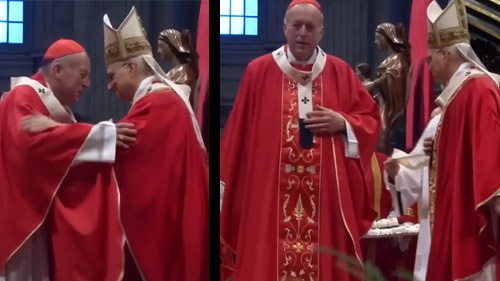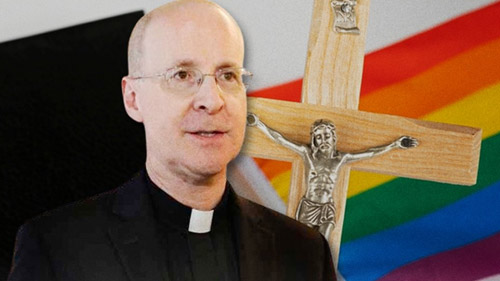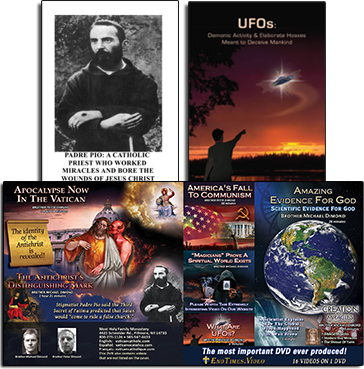February 20, 2005Mark, we are familiar with the quotations. They are not infallible statements; and they are not even Papal statements. They are a few somewhat ambiguous responses from members of the Holy Office before Vatican II and they reflect the growing Modernism that was capturing large parts of the clergy from the time of the late 1800's to Vatican II – as exemplified by the rampant denial of the dogma Outside the Church There is No Salvation found in many theology texts and manuals from the period. So, to reiterate, they are not infallible or binding, and, if they do in fact endorse birth control by means of NFP (as they seem to), they contradict the Magisterial teaching of Pius XI that the primary purpose of marriage and the marriage act is the procreation of children – and that the other purposes or ends of marriage must always be subordinated to the procreation of children. NFP violates this by subordinating the procreation of children to other ends by deliberately trying to avoid it.
February 13, 2005Art, there is no obligation to refer to heretics, even those validly ordained, as "Father." The Councils of the Church did not hesitate to refer to Arius, Nestorius, and the other heretics simply as Arius, Nestorius, etc. even though they were priests and Bishops.
II Council of Constantinople, 553, Can. 11: "If anyone does not anathematize Arius, Eunomius, Macedonius, Apollinarius, Nestorius, Eutyches..."
I refer to Fr. Wathen sometimes as "Mr." Wathen in the article because he attacked our status as religious, so it was necessary to emphasize that he has no status as a Catholic and therefore no actual right to the title of "Father," even though he is a validly ordained priest. But that really shouldn't bother you if you can see that Fr. Wathen is a heretic – which he is. We don’t know if one should go to his Mass at all, considering the manner in which he is broadcasting his heresy. It would be a debatable proposition if one could go there at all, but no one could ever give him any donations.
February 11, 2005In Sess. 5, the Council of Trent's Decree on Original Sin, it is declared:
"... our Catholic Faith, without which it is impossible to please God' [Heb. 11:6]".
No heretic or non-Catholic can please God so that he becomes justified before him and that God is truly pleased with him. But God does hear the prayers of heretics to turn to the truth if they are sincere in their prayers; for instance, if the heretic sincerely prayed for the true Faith, God would answer and give the heretic the graces to be led to Catholic truth.
February 4, 2005No, the Catholic Church has never taught that. The dogma Outside the Catholic Church There is No Salvation has been solemnly defined at least seven times by Popes speaking from the Chair of St. Peter. Each time the Church has infallibly defined that all who die without the Catholic Faith are lost without exception. Never once were any exceptions mentioned about “invincible ignorance.” It is just the opposite: all exceptions were always excluded.
Pope Eugene IV, Council of Florence, “Cantate Domino,” 1441, ex cathedra: “The Holy Roman Church firmly believes, professes and preaches that all those who are outside the Catholic Church, not only pagans but also Jews or heretics and schismatics, cannot share in eternal life and will go into the everlasting fire which was prepared for the devil and his angels, unless they are joined to the Church before the end of their lives; that the unity of this ecclesiastical body is of such importance that only those who abide in it do the Church’s sacraments contribute to salvation and do fasts, almsgiving and other works of piety and practices of the Christian militia productive of eternal rewards; and that nobody can be saved, no matter how much he has given away in alms and even if he has shed blood in the name of Christ, unless he has persevered in the bosom and unity of the Catholic Church.
Dogmas must be believed as the Church “has once declared” (Vatican I). To refuse to accept this definition as it was once declared is heresy. In fact, it is the root heresy of the Great Apostasy. The Church teaches that no one above reason can be saved while ignorant of the essential mysteries of the Catholic Faith, the Trinity and the Incarnation. Yes, knowing Jesus Christ is that important.
“Now this is life everlasting, that they may know thee, the only true God, and Jesus Christ, whom thou hast sent.” (John 17:3)
That is why the great missionaries of the Church, such as St. Francis Xavier and St. Isaac Jogues, who preached in ignorant heathen cultures such as you described, knew that all who died before they could incorporate them into the Catholic Church through baptism and hearing the Gospel were lost.
St. Isaac Jogues: “… These savages, I must confess, unwillingly and reluctantly have thus far spared me, by the will of God, so that thus through me, although unworthy, they might be instructed, they might believe, and be baptized, as many of them as are preordained for eternal life.”
Could any statement from a Saint better refute the heresy of salvation for the “invincibly ignorant”? St. Isaac knew that those ignorant heathen who did not come to know the Catholic Faith and get baptized simply were not preordained for eternal life.
Romans 8:29-30- “For whom He foreknew, he also predestinated to be made conformable to the image of his Son: that he might be the first-born amongst many brethren. And whom he predestinated, them he also called: and whom he called, them he also justified: and whom he justified, them he also glorified.”
As Catholics, of course, we don’t believe as the heretic John Calvin, who held a predestination according to which no matter what one does he is either predestined for heaven or hell. That is a wicked heresy. Rather, as Catholics we believe in the true understanding of predestination, which is expressed by St. Isaac Jogues and Romans 8 above. This true understanding of predestination simply means that God’s foreknowledge from all eternity makes sure that those who are of good will and are sincere will be brought to the Catholic faith and come to know what they must – and that those who are not brought to the Catholic faith and don’t know what they must were not among the elect. That is why the Bible teaches that the Gospel is hidden from those who are lost.
2 Corinthians 4:3:“And if our gospel be hid, it is hid to them that are lost, in whom the god of this world [Satan] hath blinded the minds of unbelievers, that the light of the gospel of the glory of Christ, who is the image of God, should not shine unto them.”
St. Francis Xavier, Dec. 31, 1543: “There is now in these parts [of India] a very large number of persons who have only one reason for not becoming Christians, and that is that there is no one to make them Christians. It often comes into my mind to go round all the Universities of Europe, and especially that of Paris, crying out everywhere like a madman, and saying to all the learned men there whose learning is so much greater than their charity, ‘Ah! What a multitude of souls is through your fault shut out of heaven and falling into hell!’… They labor night and day in acquiring knowledge… but if they would spend as much time in that which is the fruit of all solid learning, and be as diligent in teaching the ignorant the things necessary to salvation, they would be far better prepared to give an account of themselves to our Lord when He shall say to them: ‘Give an account of thy stewardship.’”
Here we see that St. Francis Xavier is saying that these ignorant heathen in India would easily become Christians if there were someone to instruct them, and yet they are still going to go to hell if they don’t hear about the Faith. This eliminates the idea of salvation for the “invincibly ignorant” or salvation by “implicit baptism of desire.” Why did he have such a conviction? It is because he believed in the dogma Outside the Church There is No Salvation the way the Church infallibly defined it. So, in summary, the Catholic Church has never taught that souls ignorant of the Catholic Faith can be saved. It has infallibly taught the opposite. To hold that a soul can be saved above reason who is ignorant of the essential mysteries of the Catholic Faith is heresy.
You Feenyites say that God will furnish everyone with what is necessary for salvation, provided there is no hindrance on the person's part. For example, if someone is raised in another religious tradition or lives in a country that is not open to the Church and if the person uses natural reason in seeking good and avoiding evil, God would lead a person to believe, through internal inspiration or through the means of an angel, what has to be believed.
This is absolutely ridiculous. Effectively, the Feeneyites are saying that there are no *truly* misinformed or ignorant non-Catholics since, for them, God would reveal to them what has to be believed by supernatural means. Is this realistic?...
A. T.
MHFM: Ridiculous, eh? Yes, ridiculous to a faithless heretic such as yourself. You are obviously totally obstinate. You are not even remotely Catholic. And you have no divine Faith in Jesus Christ’s truth whatsoever. Since you cannot see the justice in the dogma Outside the Church There is No Salvation, you refuse to believe it.
Pope Leo XIII, Satis Cognitum (# 9), June 29, 1896: “… can it be lawful for anyone to reject any one of those truths without by that very fact falling into heresy? – without separating himself from the Church? – without repudiating in one sweeping act the whole of Christian teaching? For such is the nature of faith that nothing can be more absurd than to accept some things and reject others. Faith, as the Church teaches, is that supernatural virtue by which… we believe what He has revealed to be true, not on account of the intrinsic truth perceived by the natural light of human reason [author: that is, not because it seems correct to us], but because of the authority of God Himself, the Revealer, who can neither deceive nor be deceived… But he who dissents even in one point from divinely revealed truth absolutely rejects all faith, since he thereby refuses to honor God as the supreme truth and the formal motive of faith.”
The fact that no one can be saved without knowing the essential mysteries of the Catholic Faith, and therefore that God will supernaturally reveal to those of good will what they must know, such as when He sent an angel to Cornelius in Acts 10:3, is “ridiculous” to someone who has no divine Faith in what Jesus Christ has revealed. It is not ridiculous, however, to a Catholic who believes in the dogma Outside the Church There is No Salvation and therefore holds that knowing Jesus Christ is absolutely necessary for all above reason.
St. Thomas Aquinas, De Veritate, 14, A. 11, ad 1: Objection- “It is possible that someone may be brought up in the forest, or among wolves; such a man cannot explicitly know anything about the faith. St. Thomas replies- It is the characteristic of Divine Providence to provide every man with what is necessary for salvation… provided on his part there is no hindrance. In the case of a man who seeks good and shuns evil, by the leading of natural reason, God would either reveal to him through internal inspiration what had to be believed, or would send some preacher of the faith to him…”
St. Thomas Aquinas, Sent. II, 28, Q. 1, A. 4, ad 4: “If a man born among barbarian nations, does what he can, God Himself will show him what is necessary for salvation, either by inspiration or sending a teacher to him.”
You call this “ridiculous” because, unlike Catholics, you don’t believe that, “
… the name of Our Lord Jesus Christ… Nor is there salvation in any other. For there is no other name, under heaven, given to men, whereby we must be saved” (Acts 4:12). Those who die in ignorance of the Gospel were left in ignorance because they were not of the truth. They were not of good will. That is the teaching of Catholic Tradition and Catholic dogma.
Pope St. Pius X, Acerbo Nimis (# 2), April 15, 1905:“And so Our Predecessor, Benedict XIV, had just cause to write: ‘We declare that a great number of those who are condemned to eternal punishment suffer that everlasting calamity because of ignorance of those mysteries of faith which must be known and believed in order to be numbered among the elect.’”
John 10:14: “I am the good shepherd, and I know mine, and mine know me.”
John 10:16: “And other sheep I have, that are not of this fold: them also I must bring, and they shall hear my voice, and there shall be one fold and one shepherd.”
John 18:37: “For this was I born, and for this came I into the world, that I should give testimony to the truth: every one who is of the truth, heareth my voice.”










 " />
" /> " />
" /> " />
" /> " />
" /> " />
" />





